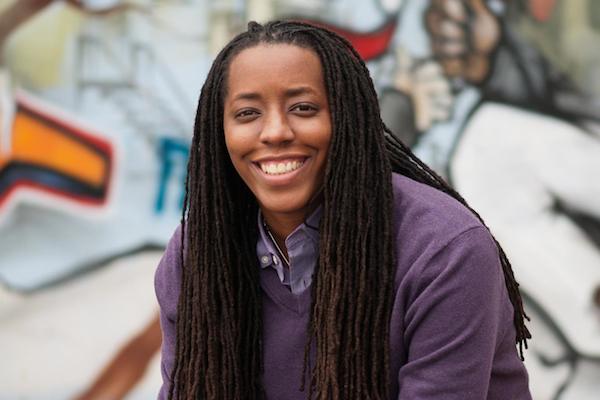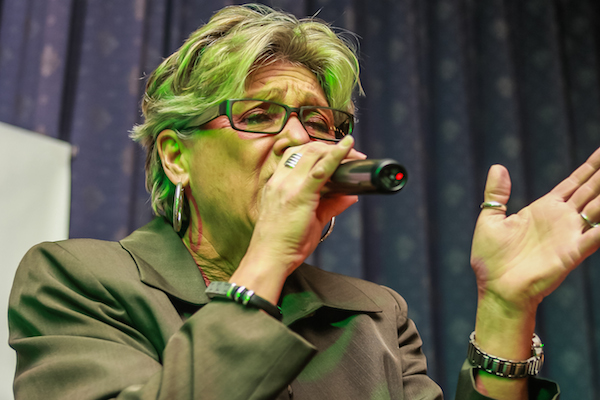

One pervasive misnomer is that lesbians choose to become lesbians because we were all sexually abused by a man (or men) and we therefore become man-hating, militant feminists who look like really harsh versions of…well, men.
I know many women in the lesbian community who were not sexually abused; I, on the other hand, am not one of them. I was sexually abused as a child. I was five years old when “it” happened and I suffered immensely from the events that occurred thereafter. And, despite all of the girl crushes and lesbian friends, I told myself I couldn’t be gay. I was just damaged and needed to get the guy thing “right.” I needed to be fixed and I didn’t or couldn’t trust myself to just be me. For many years, I remained captive in my nice cozy closet, all the while decorating the door so I could appear perfect, normal, and well adjusted. The mistrust I had of myself was not exclusive to my sexual orientation. Choices in work, where I lived, and what I did were all based on an idea of what I thought I should be and be doing. I clung more tightly to this myth when, in my twenties, I heard from a friend that her therapist said being gay was a cop-out for not dealing with abuse. That worked for me for a good decade or so. And then I dealt with my abuse.
I spent years acknowledging, looking at, talking about, feeling about my abuse. I bathed in the trauma both in therapy and in my daily life. And then I came out the other side—no longer as “abused” but simply as a person…a whole person who has abuse as part of my life story. I realized that for years I’d played out the story of my abuse and it’s aftermath in my relationships. And I stopped doing that. So, naturally, I should have gone on to become the poster child for the heterosexual survivor, right? WRONG. I was still left with the voice—you know, the “I am gay” voice that patiently waits to be heard and cannot be silenced despite the application of you-name-it (alcohol, drugs, work, food). In fact, the voice was stronger and clearer. If anything, I am not gay because of my abuse; I’m gay in spite of it.
Being out does not magically solve all of life’s problems. I am not an enlightened being. I have days (sometimes several in a row) when my past creeps in and the old messages of un-lovability and worthlessness scream at me. The difference for me is that I can navigate these issues with full acceptance of who I am. Life isn’t complicated by layers of facades on top of issues on top of old wounds. When I come to an understanding or resolve an issue, I develop a deeper bond with myself and with my partner because the exchange is based on honesty. All of my relationships with men were based on a lie—one I told them and one I told myself.
Instead of assuming that lesbians are lesbians because we were somehow driven to love women by abusive men (which frankly isn’t the most ludicrous thing anyone could ever do), perhaps there is a more logical explanation? Perhaps it is because the sample size of women who identify as lesbians (1.5% according to Volokh, The Washington Post, July 2014) is relatively small when compared to the number of women in general who report childhood sexual abuse. The numbers on abuse vary; however according to The National Child Traumatic Stress Network, which cites statistics from the CDC, U.S. Department of Health and Human Services, and The U.S. Department of Justice, approximately 25% of women in the U.S. have been sexually abused. There has not been any reputable study that demonstrates a causal relationship between abuse and homosexuality (Throckmorton, 2009). If the correlation were true, practically and tragically speaking, wouldn’t one in every four or so women in the U.S. identify as lesbian instead of the current reports of one in sixty seven?
False assumptions exist for a variety of reasons. We as humans often seek to grasp onto the illusion of security by separating ourselves from what we fear and joining in the larger group by alienating a small segment of society. In the end, this fails and simply separates us from ourselves. Not all lesbians were sexually abused nor do most women who were sexually abused become lesbians. Period. And I wonder…if there are a select few women who can only find love, safety, and comfort with another woman because of their traumatic pasts, is that such a bad thing?
M.P.R. Newman, M.Ed. is the mother of three super cool humans, a writer, and a Special Education Administrator. Maria would love your feedback and is committed to responding to all of her readers. Please share your thoughts and stories by contacting her directly at mprnewman@gmail.com.